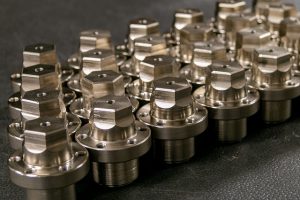
Metal fabrication facilities have many different processes which have the potential to leach pollutants into groundwater from surface level contamination. Raw material storage, parts and equipment degreasing, metal sludge, metal surface treatment, galvanizing, painting, and finished product storage are just a few of the high risk areas.
It is important to know your NAICS Code to make sure your businesses is complying with all local, state and federal regulations. In addition to protecting our earth and complying with regulations, taking steps to prevent spills and be a good neighbor is good for business!
WHAT CAN WE DO TO HELP PROTECT GROUNDWATER?
Despite the complexities within the metal fabrication industry, all businesses can reduce the potential for contamination by ensuring pollutants are stored and disposed of properly. This is key to keeping contaminants out of our drinking water and avoiding potentially expensive clean-ups in the future. Here are just a few best management practices (BMPs) businesses could implement to reduce spills and cut back on toxic waste.
- Switch to aqueous and less toxic degreasing agents
- Segregate metal dusts and scrap for resale
- Use tarps, drip pans, and other spill collection devices
- Recycle oil from cutting/machining operations
- Recycle metal sludge through a metal recovery vendor
- Clean-up minor spills (0.5 to 5 gallons) with granular absorbents, such as cat litter, and have it hauled away by a licensed disposal company
- Use inventory control and just-in-time practices to reduce waste and avoid storing extra contaminants
- Frequently check pallets, raw materials, and containers for leaks
- Keep floors clean and dry to minimize what is tracked outdoors
- Train all employees on spill prevention and containment
What have others done?
In one case study, APS Materials Inc., a small metal finishing company in Dayton, Ohio, found a safer alternative solvent for degreasing its operations used to clean orthopedic implants. Originally APS used TCA and methanol in its degreasing process but switched to a dilute limonene solution. The dilute terpene-based cleaner adequately cleaned metal parts without adversely affecting the performance of the plasma-arc coating application.
The replacement cleaner resulted in a cost savings of $4,800 per year and a payback period of 4.5 months. Additionally disposal problems associated with methanol and TCA were eliminated.
Learn from other businesses featured in the EPA’s Pollution Prevention Case Studies on Safer Alternatives for Solvent Degreasing Applications.
Additional Resources / Assistance
In the last few years, changes to Indianapolis zoning codes and Marion County health ordinances have likely affect your business operations by mandating certain Best Management Practices (BMPs) that were previously voluntary. There are many resources and face-to-face help to assist you in preventing pollution and complying with these and other federal guidelines.
- Contact us for a business assessment, help on developing your spill plan, or compliance questions regarding the Marion County Health Department Regulations.
- Review our resource page for helpful videos, websites, and signs for your business.
- Visit Minnesota Stormwater Manual for more tips on preventing pollution in the fabricated metal sector
- Contact the Indiana Department of Environmental Management for free assistance through their Compliance and Technical Assistance Program (CTAP) with any aspect of environmental contamination, cleanup, or regulations in the State of Indiana.
